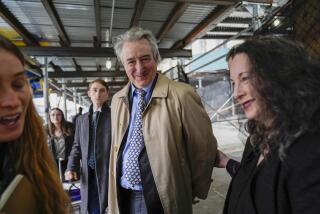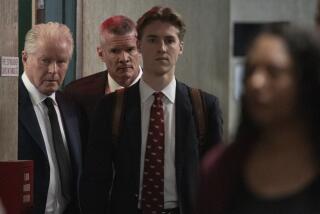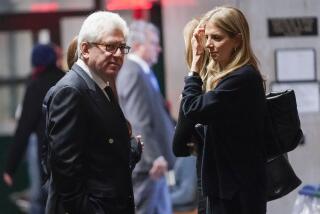Henley Is Ready for Trial Kickoff : Courts: Attorneys plan spirited defense of the Rams player, accused of running a drug ring from his Brea home and using a cheerleader as a cocaine courier.
SANTA ANA — Beleaguered Rams cornerback Darryl Henley is approaching his upcoming federal drug conspiracy trial with the same aggressive attitude that has made him a standout with the professional football team.
Vigorously maintaining their client’s innocence, Henley’s two attorneys say they expect to prove in a trial beginning today that Henley played no part in a cocaine trafficking ring that extended from California to Georgia and allegedly involved the player as well as a Rams cheerleader.
Henley is so confident he will win the case that his lawyers have not even entertained the idea of a plea bargain.
“My client is innocent,” Henley lawyer Roger Cossack said. “We’re ready to go to trial.”
Henley, 28, who has declined to discuss the case in recent months, was unavailable for comment, according to Gerald Chaleff, another of his attorneys.
Considered one of the Rams’ best defensive players after his recently concluded sixth season, Henley was indicted in December, 1993, on federal charges of cocaine possession and conspiring to operate a drug ring from his Brea home.
Federal prosecutors say he masterminded multi-kilogram cocaine shipments from his home to Atlanta and Memphis using then-Rams cheerleader Tracy Ann Donaho to carry the drugs in luggage on commercial airlines. She is expected to testify against him, prosecutors say.
Henley and Donaho, who was 19 at the time, are two of the eight people indicted by the federal grand jury for their alleged roles in the drug ring. Three of the other six were also charged with threatening to kill Henley when he allegedly refused to pay off a drug debt. If convicted, Henley faces life in prison and $4 million in fines.
Prosecutors declined to comment on the case last week. But in the past they have called the trafficking ring “sophisticated,” with Henley allegedly at its center.
“Darryl Henley played an integral role,” Assistant U.S. Atty. Deirdre Z. Eliot has said.
Henley’s arrest shocked the football world. The Rams were further enmeshed in the controversy in September when the team posted an additional $2-million bond so the defensive back could travel outside the jurisdiction of the local federal court to play in NFL games.
Henley’s lawyers expect the trial to draw national media attention to the federal courthouse in Santa Ana. Serious felony charges are still relatively unusual among high-profile, highly paid athletes, Cossack said.
Some NFL players have worried that the indictment of Henley would hurt the sport’s image, said Rams defensive safety Anthony Newman, who has known Henley for six years and lives near him in Brea.
*
“We all think, ‘Let’s hope this doesn’t look bad.’ We tell everyone to stay away from this sort of thing and then you have a professional ballplayer caught up in it,” Newman said. “It’s kind of a shock and hard to deal with.”
Newman believes strongly that Henley will be exonerated, but the indictment demonstrates another reason why the public should not put sports figures “on a pedestal.”
“Things happen. . . . We’re human beings,” Newman said.
Despite the charges, the Rams signed Henley last September to a $162,000 contract, cutting wide receiver Todd Kinchen to make room for him on the roster.
Kinchen, who later rejoined the team, at the time called the decision a signal that football “is losing the good morals, the clean-living lifestyle” that has made it popular.
However, the Rams’ decision to stick with Henley paid some modest dividends on the field for the loss-plagued team. Despite the distraction of the impending trial, Henley was a key member of the team’s defense, Rams spokesman Rick Smith said.
Henley approached his career-best numbers, tying safety Marquez Pope for the team lead with three interceptions and coming in sixth in tackles with 64.
“It was remarkable because with all this hanging over him, he played extremely well,” Smith said.
If prosecutors have their way at the trial, this season will be Henley’s last. Federal authorities are planning an aggressive campaign with the help of two co-defendants who have pleaded guilty. Both are cooperating with prosecutors and will be sentenced after Henley’s trial, Cossack said.
One of them is Donaho, the government’s key witness, according to court documents. She pleaded guilty in December, 1993, to conspiracy to transport cocaine.
The second is Alejandro Figueroa Cuevas, charged with extortion for allegedly threatening to kill Henley if he did not come up with money he owed them for a cocaine deal.
In a taped phone conversation, Cuevas also told Henley’s family members that Henley had “made a drug deal,” according to court documents. Cuevas is expected to testify against Henley and other defendants charged with drug conspiracy and extortion.
Donaho told U.S. Drug Enforcement Agency investigators that Henley approached her in early 1993, offering her money to carry a suitcase containing a large amount of cash to Memphis. He later paid her $1,000, she said. Donaho said Henley asked her to meet Willie McGowan, a boyhood friend of his, at Henley’s home in Brea and carry the suitcase on a flight from Burbank to Memphis. Henley said reservations had been made for her under the name “Maggie Williams,” she said.
*
In Memphis, another of Henley’s alleged cohorts, Gary West, met Donaho and drove her to an apartment, where she left the suitcase, which actually contained four kilos of cocaine, according to the indictment. West waited a day then picked up the suitcase at the apartment, authorities said. Donaho contends that she later learned that the suitcase contained cocaine.
A second shipment of 12 kilos of cocaine, this one carried on a pre-dawn flight to Atlanta, was handled in roughly the same manner, according to the indictment.
This time, however, federal agents intercepted Donaho in Atlanta as she got off the airplane with the drugs in July, 1993. A DEA agent at Ontario International Airport had become suspicious when she paid cash for her plane ticket to Atlanta and alerted agents in Atlanta that she would be arriving. Such a purchase is a tip-off that a passenger may be carrying drugs, officials said.
Donaho disavowed ownership of the bag and was permitted to leave. DEA agents, meanwhile, obtained a search warrant for the bag and discovered the cocaine inside. Later that day, Donaho returned to the airport to try to claim the bag, and was arrested. Prosecutors expect Henley’s attorneys will contend that Henley, like Donaho, did not know that the suitcases contained drugs, Assistant U.S. Atty. John Rayburn said during a court hearing last week.
Cossack and Chaleff also have begun attacking Donaho’s testimony as unreliable, saying she expects to receive sentencing consideration in exchange for her testimony and cooperation with authorities.
“She’s going to sing for her supper,” Cossack said.
Chaleff added that because of this pressure some of Donaho’s statements will be “inherently unreliable.”
“Without Ms. Donaho, we probably wouldn’t be here,” Chaleff said outside of federal court two weeks ago.
After more than a year of tension and waiting, Henley still has the support of many of his teammates, Smith said. “A lot of the guys consider him more than a teammate--he’s a friend,” Smith said. “We all hope it works out in Darryl’s best interests.”
Adds fellow ballplayer Newman: “All of us do (support him), there’s no question about it, and we’ve let him know . . . we’re all saying our prayers for him.”


